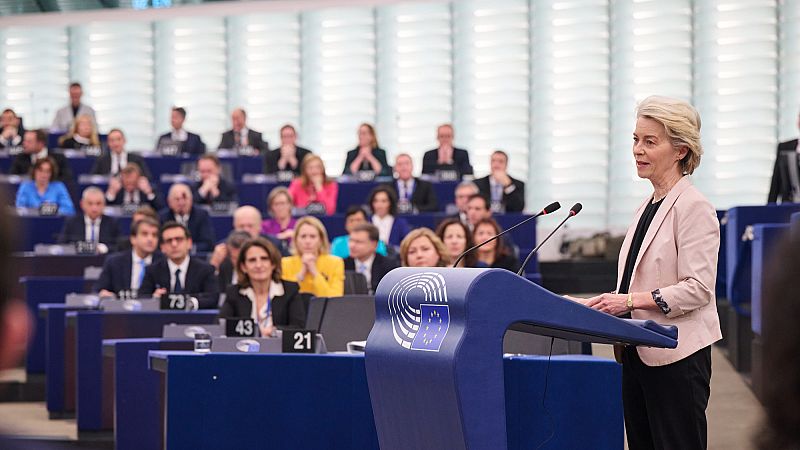
The European Parliament is set to debate and vote next week on a “motion of censure”, a no-confidence vote against European Commission President Ursula von der Leyen and her College of Commissioners.
Romanian MEP Gheorghe Piperea, from the ultra-conservative party AUR, claims he has collected 73 signatures for his motion—one more than one-in-ten minimum threshold of MEPs (72) required to initiate the process.
According to Piperea’s office, 32 members of his political group, the European Conservatives and Reformists (ECR), have backed the request. The remaining signatures came from the far-right groups Patriots for Europe (6), Europe of Sovereign Nations (26), and from non-attached MEPs.
The MEPs’ signatures are now being verified and validated by the Parliament’s services, according to internal sources.
Once the validation process is complete, President Roberta Metsola will formally inform MEPs that a motion of censure has been tabled.
A plenary debate on the request for resignation must then be scheduled at least 24 hours after the announcement, and a vote on the matter must take place at least 48 hours after the start of the debate.
Parliamentary sources told Euronews the debate could be held on Tuesday, 8 July, with the vote following on Thursday, 10 July, provided that President Metsola announces the motion by the end of this week.
However, any signing MEP can withdraw their support for the motion at any time. If the one-tenth threshold is no longer met, the process is halted.
At least two-thirds of the votes cast representing a majority of all MEPs would need to back the motion of censure for it to be adopted.
A low-chance motion of censure
This particular motion has very little chance of being approved, as even the MEP proposing it has acknowledged in an interview with Euronews.
“There will be a vote against the motion: I'm sure of this, because the majority is still there with von der Leyen. And even if in this majority there is a lot of discontent against von der Leyen, for the moment they will not force her to resign,” Piperea said.
However, the Romanian MEP hopes the initiative could “open a Pandora’s box", encouraging further motions of censure in the months ahead. “It is important that we have this democratic process, in order to force this kind of debate. Even if my motion will not succeed, there will probably be others in the future which will be successful," he said.
The motion of censure rests on three main accusations, the first relates to text messages exchanged between Commission President Ursula von der Leyen and Pfizer CEO Albert Bourla during COVID-19 vaccine negotiations.
“The EU Court of Justice in Luxemburg stated that the European Commission should disclose those SMS [...] The European Commission rejected the request. It's about separation of power in a democracy: if you cannot accept a decision of justice, this means breaking the rule of law,” Piperea claims.
Other accusations include alleged misspending of post-COVID funds and an alleged attempt by the European Commission to promote its green policies by financing NGOs to lobby MEPs, both denied by the Commission.







